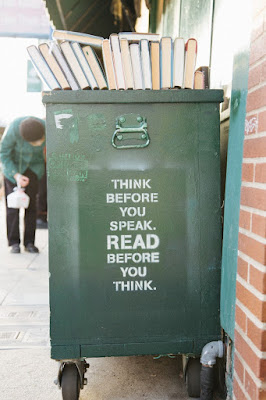 |
| Photo: Kyle Glenn - Unsplash |
In a 2013 column published in the Huffington Post entitled Why Public Schools Don’t Teach Critical Thinking, retired high-school teacher Frank Breslin lamented the state of modern American education:
The minds of children need room to breathe, to be inspired by vision, and the health-bringing balm of many perspectives. They need exercise, play, and relaxation; in short, they need a sound body and spirit to have a sound mind. Rather than spending their magical years entombed in cram-school dungeons that prepare them for impossibly difficult tests, children need old-fashioned schools where every day they can learn something new in classrooms that echo with laughter and joy!
Unfortunately, it’s government policy to make
sure schools are anything but the kind of places Breslin envisioned for
students. By emphasizing standardized testing that evaluates how many
predetermined facts a student can memorize rather than their capacity to
conduct research and pursue their own lines of inquiry, America has
created a citizenry increasingly predisposed to simply accept whatever
they read uncritically. Now it is paying dearly for following that path...
According to a study just released by the American Psychological Association,
the use of digital media by teens increased dramatically between 2006
and 2016. Jean M. Twenge, professor of psychology at San Diego State
University and the lead author of the study, states that social media
use during leisure hours doubled among high school seniors during that
period. Among 10th graders usage increased by 75% while among 8th
graders it increased by 68%.
“In the mid-2010s,
the average American 12th-grader reported spending approximately two
hours a day texting, just over two hours a day on the internet — which
included gaming — and just under two hours a day on social media,”
Twenge is quoted saying on the science website Science Daily. “That’s a total of about six hours per day on just three digital media activities during their leisure time.”
According to the same Science Daily story,
the steep rise in digital media usage has been associated with an even
more extreme drop in the use of print media. The article states:
The decline in reading print media was especially steep. In the early 1990s, 33 percent of 10th-graders said they read a newspaper almost every day. By 2016, that number was only 2 percent. In the late 1970s, 60 percent of 12th-graders said they read a book or magazine almost every day; by 2016, only 16 percent did. Twelfth-graders also reported reading two fewer books each year in 2016 compared with 1976, and approximately one-third did not read a book (including e-books) for pleasure in the year prior to the 2016 survey, nearly triple the number reported in the 1970s.
Perhaps these trends wouldn’t be nearly as
disconcerting if the rise in digital media use and the associated
decline in the use of printed material wasn’t also coming at a time when
so many members of the same generation were exhibiting such difficulty
discerning between reliable news stories and “fake” news.
In a study coincidentally released just two
weeks after the 2016 presidential election, Stanford University
researchers reported students at all levels exhibited extremely poor
skills when it came to conducting research and evaluating content
online. According to the study’s executive summary,
“Our ‘digital natives’ may be able to flit between Facebook and Twitter
while simultaneously uploading a selfie to Instagram and texting a
friend. But when it comes to evaluating information that flows through
social media channels, they are easily duped.”
Source: 71 Republic










